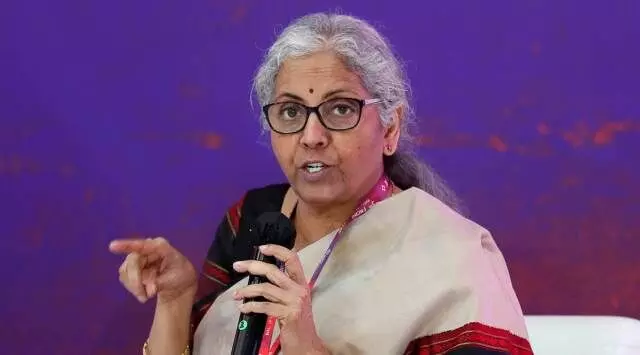
New Delhi, July 1 -- Finance Minister Nirmala Sitharaman's address at the 4th International Conference on Financing for Development in Seville, Spain, was not just a diplomatic intervention-it was a clarion call for rewriting the rules that govern the global financial order. At a time when the world stumbles through an uneven recovery and vulnerable nations wrestle with mounting debt and climate crises, Sitharaman's message pierced the fog of bureaucratic inertia: the global financial architecture is outdated, inequitable, and in dire need of reform. The existing framework, dominated by legacy institutions such as multilateral development banks (MDBs) and governed by opaque credit rating systems, is increasingly misaligned with the needs of the Global South. These systems often penalise developing economies with unfair sovereign ratings, raise the cost of borrowing, and restrict access to vital capital for developmental goals. Sitharaman's call for a "fairer credit rating system" and the alignment of MDB lending with long-term development objectives is both timely and vital. Without fundamental reforms, these institutions risk losing credibility among the very nations they are mandated to support. India's experience provides a persuasive case study in how domestic innovation can catalyse development when enabled by inclusive systems. Through comprehensive tax reforms and a digital overhaul of its tax administration, India has widened its tax base and reduced compliance burdens. These are not mere bureaucratic victories-they are enablers of fiscal space, necessary for poverty alleviation and sustainable infrastructure investment. Sitharaman pointed out that India has lifted 250 million people out of multi-dimensional poverty-a statistic that illustrates what can be achieved when national policy is supported, not hindered, by international systems. However, these national efforts are running up against a hard wall: a fragmented, unpredictable global financing landscape that is failing to meet the moment. The starkest indicator is the alarming $4 trillion annual financing gap for developing countries trying to meet the Sustainable Development Goals (SDGs). Many of these targets are now off track, and without a significant redirection of global capital flows, they may drift out of reach altogether. The decline in Official Development Assistance (ODA) only sharpens this crisis. Sitharaman rightly called for a reversal of this trend and pressed developed nations to enhance climate finance, especially for adaptation strategies in vulnerable countries. The current international architecture does not merely suffer from neglect-it reflects an entrenched imbalance in how risk and reward are distributed. For instance, sovereign debt burdens have become structural impediments to development, and yet the global mechanisms for resolving these challenges remain ad hoc at best. The Global Sovereign Debt Roundtable, initiated during India's G20 Presidency, was a constructive first step, helping to improve transparency and comparability in debt restructuring processes. But as Sitharaman noted, implementation is key. The G20's Common Framework must evolve into a reliable mechanism that not only manages debt but also anticipates it through preventative measures and inclusive dialogue.
At the heart of India's argument is the notion of equity-equity in access, in voice, and in outcomes. This is where the push for a comprehensive, development-oriented global financing framework becomes crucial. Such a framework should be built on the principles of inclusivity, country-specific context, and policy sovereignty. It should move beyond the archaic conditionalities of the past and towards a system that enables governments to pursue ambitious, people-first agendas. Predictable, concessional financing for climate action and social infrastructure must become the norm, not the exception. India's advocacy also extended to the realm of international tax cooperation and curbing illicit financial flows-issues that siphon off resources from developing countries and perpetuate inequality. While the global tax landscape remains heavily skewed in favour of multinational corporations and tax havens, India's domestic success with digital public infrastructure and targeted reforms shows that with political will, revenue systems can be made both efficient and equitable. Sitharaman's speech in Seville did more than highlight India's domestic achievements; it positioned India as a responsible voice for the Global South-a country that understands development as both a sovereign imperative and a shared global project. But speeches alone cannot bend the arc of financial injustice. It now falls upon the international community, particularly the Bretton Woods institutions and rating agencies, to heed this call and act with urgency.
For decades, the rules of international finance have been written in boardrooms far removed from the realities of the developing world. The time has come to rewrite those rules with the participation of those who have long been excluded. India has laid out a clear vision-of an inclusive, transparent, and responsive global system. The question is whether the world is ready to listen and respond with the same moral clarity. The stakes could not be higher. In the absence of meaningful reform, inequalities will deepen, and the promise of sustainable development will ring hollow. But if the world chooses to act-guided by equity, empowered by cooperation, and enabled by reform-it can unlock a future where no nation is left behind. The architecture of that future must be built now.
Published by HT Digital Content Services with permission from Millennium Post.
